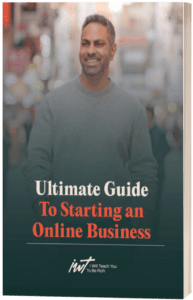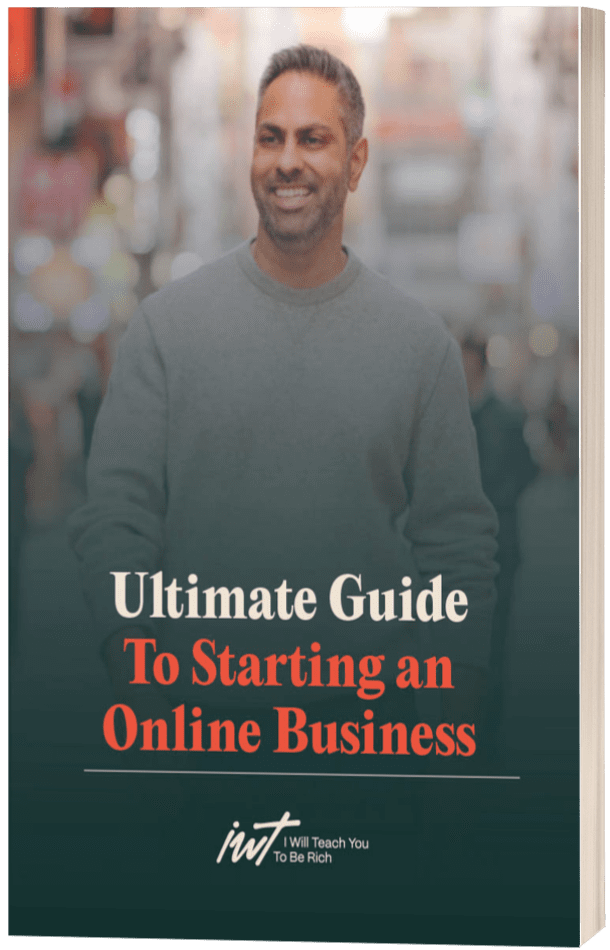Looking to launch your own startup but need some inspiration? Information products offer a lucrative and low-cost entry into the business world.
In this post, we’ll cover four kinds of information products, primarily:
- Online Courses
- Coaching
- E-Books
- Membership Programs
Why are Information Products Great Startup Ideas?

That upper right-hand corner — ideas that are low cost AND high profit — is dominated by information products.
You’ll notice that software, while it’s high-profit, also comes with a lot of costs involved. And unless you’re planning to build the next Apple, physical products fall short on both the cost AND profit side.
Other reasons that make information products great:
- They’re scalable.
- Once you have your product, you can scale startup ideas and not only sell to one person, but to 100 people, or 10,000 people — and you don’t have to change all that much about what you’re doing day to day to do it. (This is something that info-products and tech products have in common.)
- The systems are already built.
- Everything you need to launch an information product business from a technical perspective already exists.
- Building a website, recording and sharing videos, taking payments — there are software systems available to handle virtually every aspect of launching and running an information product business
Because they’re scalable and they already have systems built in place, this means you won’t need to spend time building up these systems yourself and can focus your efforts on talking to potential customers & getting sales.
Online Courses
Online courses are a great way to deliver a ton of value for your customers without taking on a lot of risk. This has been one of IWT’s strongest business model for the past several years.
Our courses are higher end as we’ve invested in premium production (videography and a recording studio) to get them produced, but you won’t necessarily need a camera crew to start your own course.
Phone cameras are excellent these days, and anyone can record good enough video courses to sell just using their phones. If you don’t want to use your phone, you can consider using the screen recording software Loom, to record your screen as you narrate through your course. That way, you can jump straight into creating your course material without having to worry about additional setup costs.
With online courses, you make a product once, and then you can sell it as many times as you want. You don’t have to rerecord the course again every time you make a sale, and you won’t need a physical warehouse to hold stock like how a traditional business would.
Online courses businesses can make a LOT of profit. We have multiple courses that have sold many millions of dollars worth, and a lot of our students and readers have grown sizable course businesses as well.
One of the best courses we’ve taught our students is Earnable. If you’re keen, check out this sneak peek inside the Earnable course library!
Coaching
Coaching is a low-barrier-to-entry info-product idea with sky-high earning potential. People want human interaction and a personalized approach — and they’re willing to pay a premium to get it.
My ‘coaching’ business is done in a slightly different way – I coach people on my podcast. While this isn’t a direct money making arm of my business, I use it as a marketing channel to build brand awareness about IWT and to help people who need help with finances. Listeners who tune in to the podcast can then sign up to my Insider’s newsletter, which I send out to over 800,000 readers.
If you’re curious about how I run my podcast, check out my most popular podcast episodes below:

It’s one of the best things I’ve published (and 100% free), just tell me where to send it:

You can also use coaching as a launch pad into developing other info-products. Once you’ve coached 10, 20, 50 clients, you’ll start noticing patterns in the questions they have and the things they get stuck on, and you’ll start to develop a system for helping them through. It’s basically market research that you get paid for.
E-Books
E-books are a particularly great option for a first-ever information product, because they’re super easy to make. You may not even have to create anything new in order to do it.
After you’ve been blogging on your topic for a while (which I recommend you do), you just pull together all the best, most useful content you have, and BOOM, you have an e-book.
I’ve been writing my blog ever since I was a college student in my dorm back in Stanford, and I’ve put out tons of e-books over the years. Recently, I’ve consolidated those e-books into Ultimate Guides of several topics for my readers. Some of my post popular Ultimate Guides are:
- Ultimate Guide to Profitable Business Ideas
- Ultimate Guide to Personal Finance
- Ultimate Guide to Remarkable Content
- Ultimate Guide to Habits
You don’t need to have mega Ultimate Guides in order to build an e-book, remember IWT has been around for more than 20 years so the amount of content we’ve been able to consolidate into those guides is going to be much more if you’re just starting out.
Start out by creating small e-books which you can use as lead magnets for your newsletter/blog. As you create more content, update your e-books accordingly and you’ll have stronger lead magnets, which will attract more visitors to your blog. The more visitors you have, the more motivated you’ll be to create additional high-quality content. This positive feedback loop will not only grow your audience but also continuously enhance your offerings, leading to an upward spiral of engagement and success.

It’s one of the best things I’ve published (and 100% free), just tell me where to send it:

Membership/Subscription Programs
When you run a membership program as your startup idea, you put some (or maybe most) of your content behind a paywall, and customers pay a monthly subscription to access it.
Membership sites can be an awesome option, especially for topics like cooking, fitness, or musical instruments — topics where the subject matter lends itself to a steady stream of content.
Here are some other examples of membership programs:
- DNG Inner Circle. Digital Nomad Girls founder Jenny Lachs’s paid membership offers bonus content, guest speakers, and events that non-paying site visitors can’t see.
- Golden Pick Monthly. Country Guitar Online offers tons of free resources for guitar players looking to master the fine art of country and bluegrass guitar. For the truly dedicated, there’s the Golden Pick Monthly subscription plan for even more guitar-picking goodness.
- Freelance Writers Den. Make a Living Writing founder Carol Tice runs this community for freelance writers looking to grow their income fast.
Fierce Grace Collective. Carrie-Anne Moss leads this year-long membership program for women, providing community support and meditation practices as well as writings, teachings, and conversations.
My Ultimate Guide to Your Next Profitable Idea
I’ve helped thousands of students create their own profitable businesses, and I have a system for going from “no idea” to a guaranteed profitable business. I want to give that system to you now.
In this guide, I’ll show you exactly how to come up with an idea that:
- People will be willing to pay for (because life’s too short to waste time on things customers don’t care about)
- You’re actually excited to build (because life’s too short to do things you don’t care about)
The only thing standing between you and starting a business of your own isn’t learning how to code or drumming up venture capital.
It’s just deciding that you want to build a business, and then taking advantage of the resources that are already in place to help you do that.
